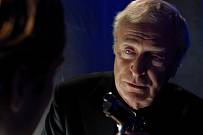|
|
||||
|
|
by Adam Hakari  1972's Sleuth, a classic film of devious playfulness, boasts one of the most cunning screenplays I've ever come across. Because that movie is not a household name, the idea of a modern-day remake won't ruffle the feathers of mainstream moviegoers. However, although this re-do isn't a bad movie by any means, those who've seen and loved the original film may wonder why it needed to be made at all. The new Sleuth, directed by Kenneth Branagh and written by renowned playwright Harold Pinter, retains the same setup as its big brother. Crime novelist Andrew Wyke (Michael Caine) has invited aspiring actor Milo Tindle (Jude Law) over to his sprawling country estate. But this meeting of the minds turns out to be more than a friendly little chat. It seems Milo has been carrying on an affair with Andrew's wife, who's putting the screws on him to give her a divorce so she and her new love can start a life together. Surprisingly, Andrew likes the idea, and, to sweeten the deal, offers Milo a peculiar proposition: fake a break-in at the mansion, then spirit away with a small fortune in jewelry and live happily ever after. Though reluctant at first, Milo accepts, thus setting off a chain of events that will have the two men locked in a neverending battle with one another, a conflict that can only end in that most theatrical of fates: murder. How should I describe my experience watching Sleuth to someone not familiar with the original (which starred Laurence Olivier and Caine as well, in the role of Milo)? Well, it's a sort of reversed version of how I felt about Rob Zombie's Halloween. Like Sleuth, the original is a bona fide classic, perfect in just about every way, so the idea of a remake seems ludicrous. Although I liked Zombie's take on Halloween, especially the new looks it gave into how Michael Myers became such an unstoppable killing machine. Still, every time a scene from the original popped up, the film seemed to grind to a halt, and I began asking myself why this flick even had to exist. Turning to Branagh's rendition of Sleuth, which actually finds its strength in sticking closer to the original source material, it takes the same premise of exploring masculinity through a series of increasingly dangerous games and examples of one-upmanship and merely places it in a modernized environment. I admit the early scenes of this remake had me excited as all get out, with Caine and Law butting heads and verbally tightening their grips around one another's proverbial necks, especially when played against the backdrop of Andrew's mansion, tricked out with enough high-tech security gadgetry to make Bill Gates blush. But as the film progresses, and as the filmmakers realized they had to make their own mark on the production, Sleuth starts to get weary as the plot's gears attempt to grind their way to the ending credits. Make no mistake, the acting here is just fine. This is a two-man show where both players are more than capable of keeping the audience interested, with the film's best moments being when Caine and Law's characters lock horns in a big way. Unfortunaetely, that's only half of the equation. The story and thematics make up the second half, and this is where Sleuth grows a little tiresome and lost. All of the story's best ideas are doled out in the first half, leaving the second part scrambling to tweak the plot with an occasional homosexual undertone. I couldn't help wondering "That's the best you've got?" It's difficult to discuss Sleuth in great detail, as both the remake and its predecessor depend quite a bit on surprises to help fuel the story. Granted, newcomers may find the latter-day Sleuth to be an intriguing little movie, but I wouldn't blame others who decide to pass it over for a more fulfilling evening spent watching the one that started it all. MY RATING: ** 1/2 (out of ****) (Released by Sony Pictures Home Entertainment and rated "R" for strong language.) |
||
|
© 2026 - ReelTalk Movie Reviews Website designed by Dot Pitch Studios, LLC |



